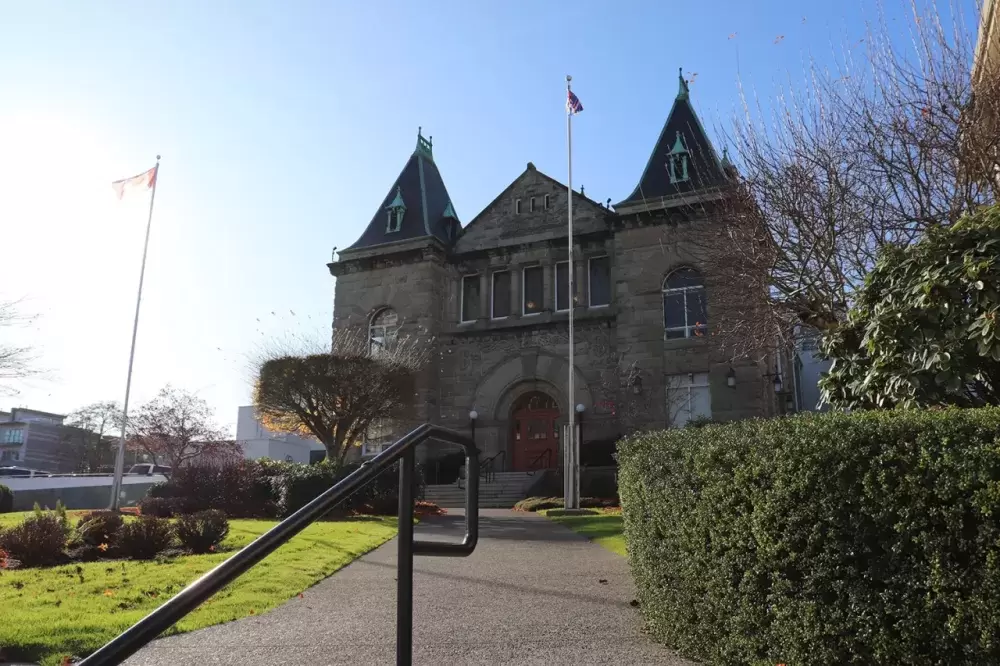On day two of a trial that delves into Indigenous content in the public school system, Candice Servatius, the mother of two students attending a Port Alberni elementary school in 2015, took the stand on the morning of Nov. 19. Servatius alleges that her children were forced to participate in a cleansing ritual and heard a “religious prayer,” which she says violates her and her children’s religious freedom.
Jay Cameron, legal counsel for Servatius, noted that in the letter sent home with students Sept. 14, 2015, the word “cleansing” was used four times. When asked what the word cleansing meant to her she replied that it indicates that something is unclean and, in her religion, Jesus’s blood is the only way one can be cleansed of sins.
She went to say that she raises her family in Christianity, a belief in God.
Servatius said she is not against her children learning about Nuu-chah-nulth culture by talking about it and perhaps showing them, “but once you light it up and walk around the room it’s not a demonstration anymore,” she said.
Nuu-chah-nulth Education Worker Sherri Cook was called to the stand to testify about the letter that went home with the children and about the events of Sept. 16, 2015. Her role with John Howitt Elementary was to introduce Nuu-chah-nulth culture into the classrooms, and the smudging practice was undertaken to “refresh the energy” after the preceding school year, which included at least one bullying incident, said Cook.
She entered the courtroom wearing a black and red buttoned blanket-style shawl and she carried an eagle feather – which became the focus of a portion of the cross examination that morning.
When asked by Cameron what her personal experiences with smudging is, Cook answered that it is not a traditional practice of the Nuu-chah-nulth but was adopted from other First Nations. She noted that spiritual practices have evolved over time and that some First Nations incorporate Christianity into their belief systems as a result of what they took out of residential schools.
“What people do depends on the individual’s preference and the family preferences,” she said.
When asked about why she carried the eagle feather she answered, “it reminds me that I need to be true to myself, and it is a symbol of the Nuu-chah-nulth belief of hishukish tsawalk, that everything is connected.”
Cameron asked several questions about smudging and spirits, at one point asking Cook if the elder performing the smudging saw spirits that day.
“I have no idea,” Cook answered, adding that she is not a trained expert in smudging.
She testified that three classrooms were smudged that day using sage smoke and that the walls and doorways were smudged, or fanned in sage smoke. She said that some people complained that the smell was too strong and those children waited out in the hall while doors were opened to air the rooms of smoke.
Cook testified that the lesson was done in the English language except for two or three Nuu-chah-nulth phrases, like hishukish tsawalk (everything is one). The phrase is common in SD70 schools and can be seen over a doorway of at least one school, according to Cook.
Children were given the opportunity to ask questions before and after the demonstration.
Following a break Cameron asked Cook if she had discussed her testimony with anyone or if she had said something to the Sheriff. Cook denied talking about her testimony but made a statement, which the judge allowed, about what she had said during the break – she talked about her feelings.
”My parents lost too much due to residential school, they were taught to worship an unfamiliar God,” she said, adding that her mother knows very little of her culture, and that she has learned her Huu-ay-aht traditions from her father’s side.
Cook stressed that she would never force religion or a spiritual practice forced on a child in school.
“We’re being questioned about our culture like it’s good versus evil,” she said, adding that there is no such thing as hell in Nuu-chah-nulth culture.
“We believe in gratitude for everything, for being on earth, for the animals that sacrifice their lives so we can eat,” said Cook. “Our culture is not a religion. It is a way of life.”
The trial continues throughout the week with staff of SD70 , including teachers, the principal and the superintendent taking the stand. Closing arguments will take place during the last two days.
A decision from the judge is not expected for several weeks.







